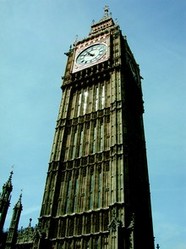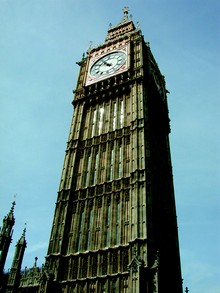If a Londoner asks why you are wearing a whistle to have a ruby, you may be understandably confused if you are not familiar with Cockney rhyming slang. Here Steve Rogerson explains what Cockney rhyming slang is and how to, and how not to, use it. And he gives a quick mention of the related Cockney backslang.

Understanding Cockney Rhyming Slang
In London, what does going up the apples to have a butcher's mean?
Visitors to London may experience a bit of a language barrier with some of the locals. The experience will not apply to whole sentences but just to the odd word that may seem out of place. This is because a minority of Londoners replace some words with different words using what has become known as Cockney rhyming slang.
How it works is that a word is replaced by a combination of two to three words of which the last rhymes with the original word. However, only the first of the new words, which does not rhyme with the original, is used. For example, in Cockney rhyming slang the word for “stairs” is “apples”. This is derived by using the phrase “apples and pears” for “stairs” and then abbreviating it to “apples”.
It should be noted here that a common mistake people make with Cockney rhyming slang is to use the whole phrase rather than just the abbreviated bit. This is wrong because the idea of the slang is to hide from strangers what it is that is being talked about.
So, using the above example, it is wrong to say: “I’m going up the apples and pears.” But it is correct to say: “I’m going up the apples.”
Changing Meaning in Cockney Rhyming Slang
Some words that originate from Cockney rhyming slang have come into common usage and have changed their meaning as a result. A good example of this is the word “berk” which is considered these days as a mild, almost affectionate insult. Yet the original slang phrase was “Berkeley Hunt”. To know what it really means, think of an offensive word that rhymes with “hunt”.
Cockney rhyming slang is also an evolving language and many of the common phrases these days are more modern. Another slightly rude example is to say you’ve just had a “Barclays”. The extended phrase here is “Barclays Bank” and it rhymes with a common word for masturbation. Another modern one is to refer to a “curry” as a “ruby” after the Irish singer Ruby Murray. Likewise the word “barney” means “fight” from the Flintstones character Barney Rubble rhyming with “trouble”.
Common Examples of Cockney Rhyming Slang
“Apples” for “stairs” mentioned earlier is one of the best known examples. Another is referring to a “suit” as a “whistle” from “whistle and flute”. Having “a butchers” means having a look, with the rhyme being “butcher’s hook”. Some Cockneys will refer to their wife as “trouble” not as a reflection on her behaviour but as a rhyme with “trouble and strife”.
Cockney Backslang
Another slightly less know slang used by Cockneys is backslang. This is where a word is pronounced backwards such as saying “kayrop” for “pork”. An example of this that has come into common use is the word “yob” which originated as the backslang word for “boy”.
You might also like
What is a Shaggy Dog Story?A look at the shaggy dog story joke format including an example of such a story.
Explore The Thames Foreshore - Find Hidden TreasureComing to London? Why not visit the Thames foreshore and discover the fragme...







 KZine Issue 31: Review of October 2021 Issueon 11/07/2021
KZine Issue 31: Review of October 2021 Issueon 11/07/2021
 KZine Issue 30: Review of June 2021 Issueon 07/05/2021
KZine Issue 30: Review of June 2021 Issueon 07/05/2021
 KZine Issue 29: Review of February 2021 Issueon 02/23/2021
KZine Issue 29: Review of February 2021 Issueon 02/23/2021
 KZine Issue 28: Review of September 2020 Issueon 10/01/2020
KZine Issue 28: Review of September 2020 Issueon 10/01/2020



Comments
SteveRogerson, Thank you for practical information, pretty pictures and product lines.
It boggles the mind to think of how these cryptic phrases begin and circulate and endure.
Why is it that pork backslanged is kayrop, not krop? The latter is more consistent with backslanging boy as yob.
Would there happen to be college or university classes or published books or scholarly articles on gnalskcab -- ;-D backslang ;-D -- and rhyming slang?